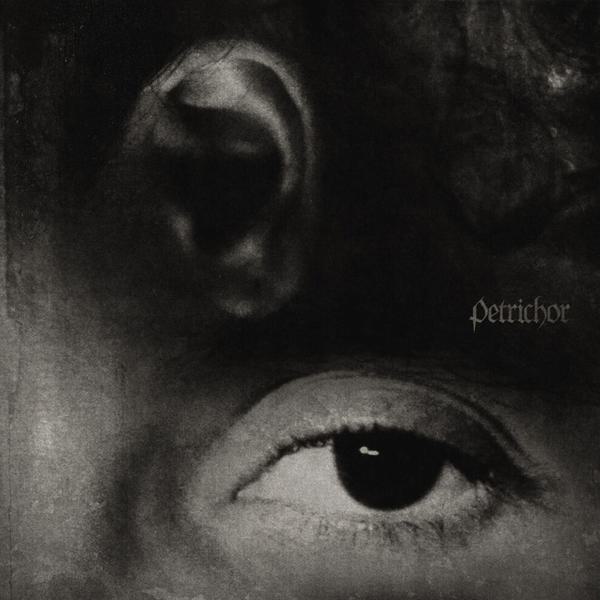
Into the blue with Cassandra Jenkins
Cassandra Jenkins tells Alan Pedder how getting out of her own way and leaning into her obsessions were pivotal to the creation of My Light, My Destroyer, Best Fit’s album of the year.
In the time before transistors, household radios relied on small glass vacuum tubes invented by an American named Lee de Forest, the self-described ‘father of radio’ blessed with a crude but poetic understanding of how his early technology worked.
Writing in his autobiography, de Forest imagined the flow of electrons within these tubes as “tiny ferryboats,” loading and unloading their cargo of charge as they pass between electrode ‘ports.’ Back and forth, back and forth, until “caught by a cohesive force” they would build up “little bridges, or trees with quaint and beautiful patterns.” It’s an image that’s stuck with me over these many months of listening to Cassandra Jenkins’ flawless third album, My Light, My Destroyer, a cosmically minded odyssey into the mechanics of loneliness and building oneself anew. At heart, Jenkins’ songs are often a way for her to ferry herself emotionally from A to B – sometimes in very literal terms – but there’s a confidence to them that insists almost always that there be a C: a peak to climb, an impulse to capture, many rivers to cross.
As Jenkins tells me over creamy hotel coffee one rainy morning in London, My Light, My Destroyer has a lot to do with energy and charge. After two years of almost non-stop touring behind the word-of-mouth success of 2021’s An Overview on Phenomenal Nature, Jenkins was zeroing in on near-total depletion. She just didn’t fully know it at the time. “When you’re running on fumes, the fumes just tell you to keep on going,” she says softly. “It’s a different kind of mentality that doesn’t stop to consider your own well-being. I remember having to ask myself ‘Am I burnt out?’ but by the time I thought to ask that it was already far too late.” Jenkins learned the hard way that ignoring a problem doesn’t make it go away. “It’s just going to show up uninvited,” she says, with just a flash of something verging on regret.
It's understandable that Jenkins would want to capitalise on the momentum that seemed to manifest out of nowhere and just kept on rolling. Five years ago, she was in crisis mode following the passing of celebrated singer/songwriter/poet David Berman, who took his own life shortly before Jenkins was about to join his band Purple Mountains on a lengthy North American tour. For a time she thought she may never tour again, and binned off almost an album’s worth of songs. When she did eventually go into the studio, it was with a documentarian’s restraint. For a record made in the wake of such turmoil, An Overview… felt curiously breezy, the music mostly hinting at her psychological torque rather than surrendering to it. My Light, My Destroyer is different, wearing the discomfort it came from more ingrainedly, a memento mori no longer pinned to her jacket but tattooed on her palm.
Jenkins began recording the album in late 2022, just two weeks after coming off her last tour, only to listen back and realise that she had too little in the tank. The electricity she’d hoped to articulate had fizzled out, right underneath her nose. “I think I wasn’t recognising a certain amount of pressure that I was feeling,” she explains. We’ve all seen memes along the lines of ‘Wait, it’s 2024? I’m still processing 2020,’ and for Jenkins it was doubly true. “I had been through such a big shift in my career that was very transformative. It’s a very ‘me’ thing to think, ‘Okay, I’ve had enough character development, can you just give me a break? Can’t I just cruise for a second?’ but I had to recognise, ‘Oh, I have an opportunity to grow and change, and I’m resisting it.’ Addressing that resistance, and where it lives in me, in my writing and in my day-to-day life, was a really uncomfortable process, but I had to go through it in order to grow.”
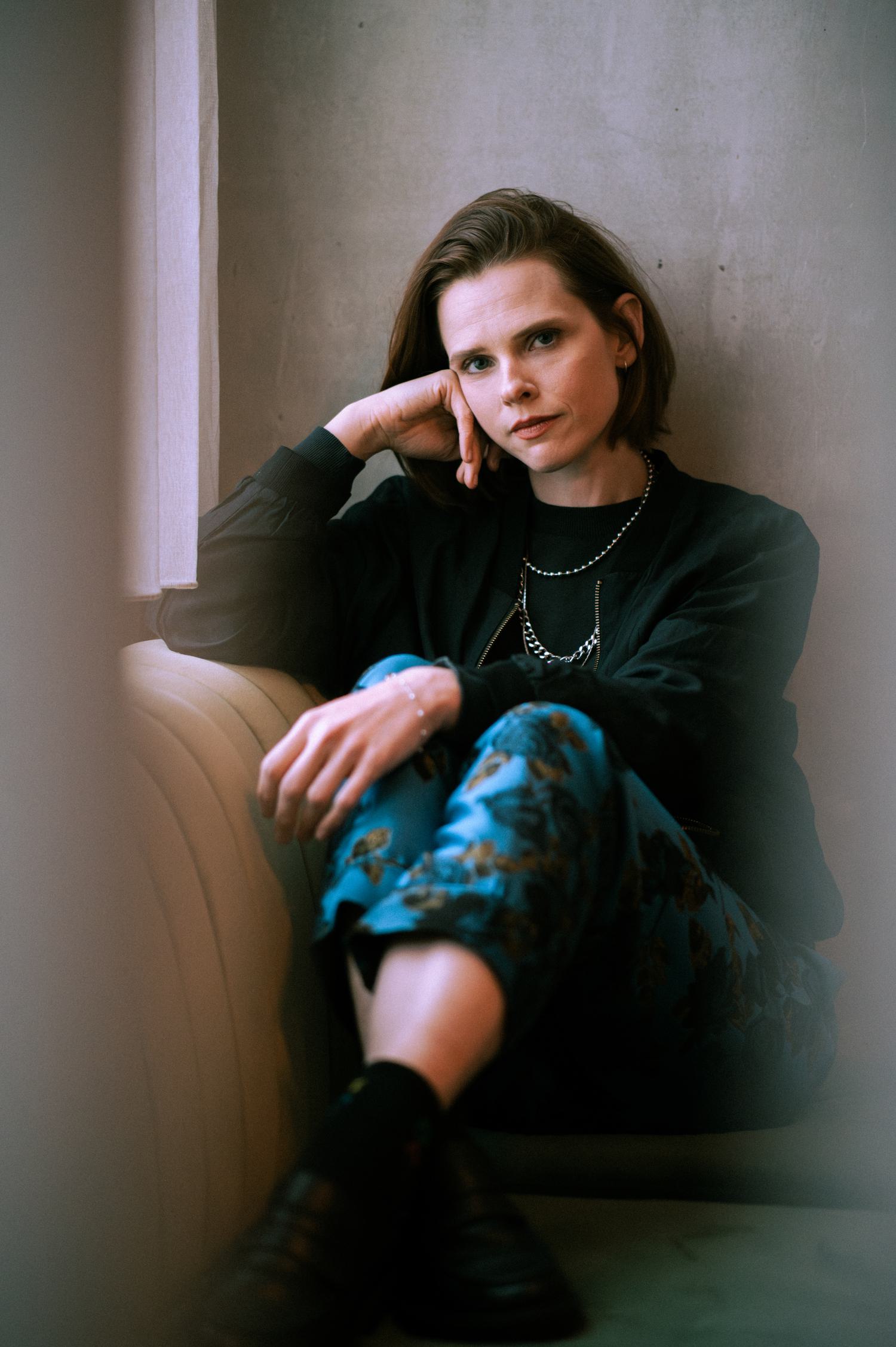
Jenkins’ recovery started with getting regular sleep, spending more time with her family, and going back to her old job working at a local farmer’s market. Having avoided public spaces as much as possible during the pandemic, barely seeing her friends between tours, she had, to some extent, internalised the constant anxiety of getting sick and allowed it to divorce her from the things that make her feel alive: live music, art shows, the buzz of commingling in a creative space. When she started going to shows again, tentatively at first, to see friends like Palehound and Tomberlin, she says she felt a surge of exaltation; a charge that changed everything. “I felt an electricity move through me and all of a sudden I was reminded of places inside of me that had gone sort of dormant,” she says. “My music had never been separate from community before. It was always a result of community, and an effort to be a part of a community. I realised how much I absolutely need the people in my life.”
Jenkins doesn’t care much for timelines, in terms of what happened exactly when in the course of making a record, but, once she finally rounded the corner she’d been trying to define, things started to move quickly. Regrouping with a cast of friends including producer Andrew Lappin, Palehound’s El Kempner, Hand Habits’ Meg Duffy, Katie von Schleicher, and Josh Kaufman (one-third of Bonny Light Horseman), she started over. Jenkins says that she doesn’t try to overthink things when creating, calling it “a recipe for art that’s kind of stilted.” So much of her growth as a songwriter, and elsewhere, has been in finding ways to let things take their natural course, to not “grip things too tightly.” She references a favourite Leonard Cohen song, “In My Secret Life,” as an expression of some of what she’s struggled with. “Loosening your grip is something you always have to do as a human,” she says. “It’s a lifelong process, and you never master it. You just have to learn how to sense when that’s what you need to bring to a situation. It’s a muscle you need to develop.”
Jenkins says she’s finally at a place in her life where she can practice acceptance, but also wanting to keep things moving forward. To keep asking the questions that will bring her to what’s next. If An Overview… was intended as a curtain call, as Jenkins has said in the past, My Light, My Destroyer comes from a different perspective entirely. There will be other Cassandra Jenkins records – she knows that now – and with that knowledge comes a freedom and a renewed sense of discovery. When we first speak in London, she says that she’s still in the process of learning what the songs mean to her, and how they relate to the world both in and outside of the record. Her eyes light up when I ask about the connection between the clock that hits her like a hammer in “Devotion” and the clock she punches in the face in “Only One.” As it happens, there isn’t one – at least not one she’d been consciously aware of until now.
“That’s the gift that I receive when I put something out into the world, people making those connections,” she says happily. “Similarly, after I finished the album, I realised that it begins and ends at dawn, which is such a rich time of day. Twilight. Neither light nor dark. You’re in the Bardo, in limbo. It’s a liminal space that’s very open to exploration.” She laughs at herself: “To begin and end a record thinking about time is such a songwriter thing to do.”
One could say the same thing about much of Jenkins’ careful way with words, like how she laments a missed soft rhyme in “Aurora, IL” (“I’ll sometimes fix it live,” she says) or how she can’t help but leave us lyrical breadcrumbs to follow. Take “Clams Casino” as the most obvious example. It’s a song that calls repeatedly back to An Overview…’s essential “Ambiguous Norway.” Not just in the way the last lines of the old song lead into the new – “I walk around alone / Laughing in the street” becomes “I don’t wanna laugh alone anymore“ – but also in shared references to clouds and to an off-the-rack Zara suit that Jenkins had bought to wear on the Purple Mountains dates but ended up wearing on her own tour, criss-crossing North America and Europe a few times over.
“I don’t think I’d really considered the weight behind that choice,” she says, thinking back on how the navy blue suit had become a part of a completely different story than the one she’d intended it for, bookended by the two songs in question: a strangely profound life-and-death arc for a product of fast fashion. When Jenkins sings about “eating the pavement” in “Clams Casino,” it’s a direct reference to the festival in San Francisco when she tripped and fell on her way to the stage, ripping the suit at the knees. “I remember thinking at the time, I’m not going to read too much into this, but I think this chapter is over. It’s time to write new songs.”
There’s a whole essay that could be written about all the layers of “Clams Casino” alone – the hotel bar setting that calls back to “Hotel Lullaby” from 2017’s Play Till You Win, the pull of the ocean that continues the story of An Overview…’s “New Bikini” – but, for Jenkins perhaps the most important lyric of all is the one about looking for a silver lining, “because I know I’m not going to find it.” “There’s no silver lining to tragedy,” she says, referring again to the period of grief that she was emerging from. “But it’s very tempting to look for it. It’s tempting to try and put a narrative together that has a happy ending, especially when you grew up on Disney. I think that’s why I’ve become really attached to a lot of [Hayao] Miyazaki films, because of the way they accept emotion and complexity in stories in a way that Disney doesn’t quite capture.”
In that context, it's fun to think of My Light, My Destroyer as like the magical front door to Howl’s Moving Castle, in the sense that its songs often function as portals to psychological liminality, turning the dial – and thus the destination – from verse to verse. Look closely at the way that Jenkins constructs her songs and the trick reveals itself time and again: minds flip, perspectives shift, a C comes out of nowhere on the way to B from A. “For me, oftentimes it’s the second verses that are the hardest to write,” she explains. “When a song is in a traditional verse-chorus-verse form, I feel like the second verse has to be transformative. There has to be a change that happens, and once I unlock what that change can be then everything else starts to make sense.”
She points to My Light, My Destroyer’s “Aurora, IL” as a good example of what she means. The song starts out in Covid isolation, doing laps of the parking lot of a hotel, “looking for signs of life,” but by verse two we’ve zoomed all the way out to beyond the Earth’s atmosphere and back, returning to the contracted world of confinement in the final verse. Though she wonders aloud how long she can stare at the ceiling before it kills her, she’s adamant that Aurora wasn’t a sad place but a healing one. Early on in the writing, when there was a danger that the song felt dismissive of the city as “a middle-of-nowhere place to be stuck,” the penny dropped for Jenkins that the song “had to capture a more complex representation of what it feels like to be stuck, and how to ultimately come out that space with some sense of clarity.”
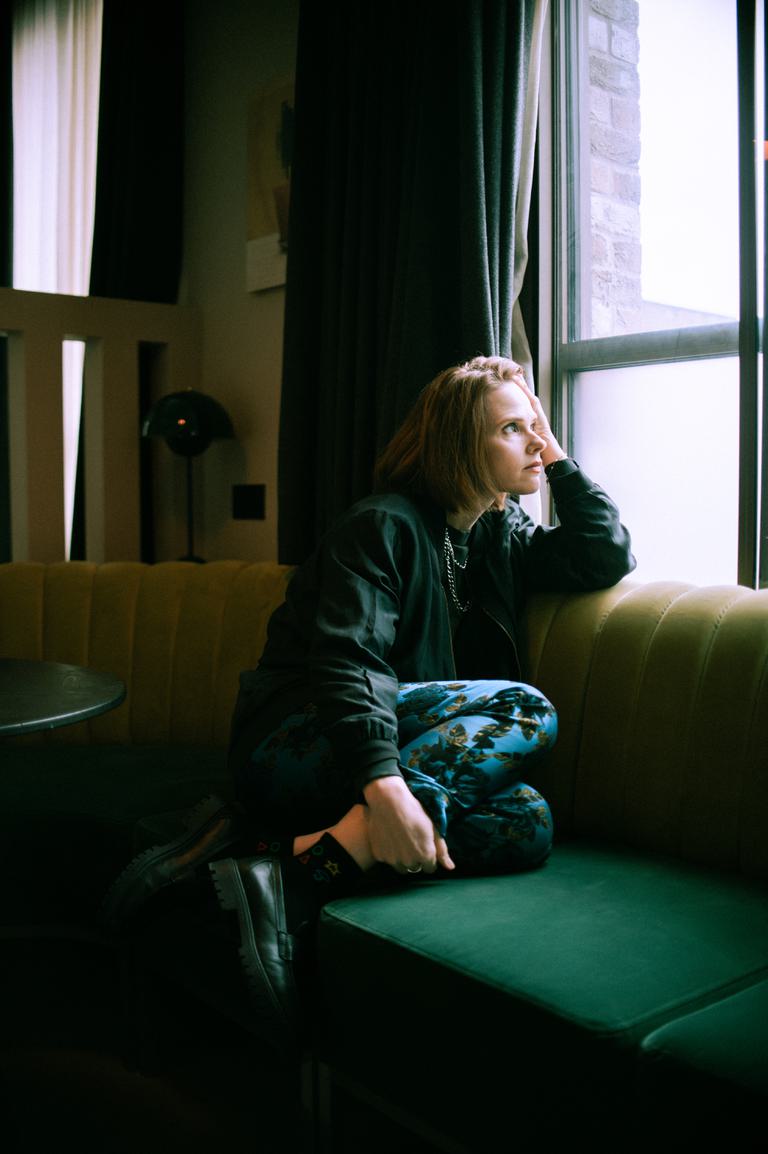
For Jenkins, this meant taking a cosmic view of her situation, reframed through the tale of William Shatner’s journey to near-space aboard the Blue Origin shuttle, becoming the oldest person to cross the Kármán line, and possibly the wisest. Egged on by her friend, the writer Gideon Jacobs, Jenkins says she became obsessed with the story of Amazon CEO Jeff Bezos sending Captain Kirk into space, and there’s a whole separate performance art piece to come out of that later (“I’m calling it a space opera,” she says, grinning). She’s obsessed, too, with the ‘overview effect’ that astronauts can experience when faced with the formidable reality of the universe beyond our blue-green ball. It’s something she says she likes to “microdose on” by visiting planetariums but thinks that Shatner might have overdosed on it, returning from his joyride as a changed and troubled man. “I think he walked that line between nirvana and mental breakdown, and I wanted to capture that and my experience of being in Aurora in a very melodramatic way. I was finding a lot of clarity there, but I was also feeling cooped up and crazy.”
Reflecting on his experience of space in his essay collection Boldly Go, Shatner likens his Blue Origin journey to a funeral, saying that instead of the majesty and mystery he’d expected to see out in space, all he saw was death. In “Aurora, IL,” it’s not the stars but a hotel room ceiling that trailers an imagined doom, but the sentiment is just as thrilling. In his book, Shatner also talks about the Earth being wrapped in a blanket of blue, and especially about the thin blue line that outlines the edge of space. “That really left an impression on me that was hard to encapsulate,” says Jenkins, who borrowed the line for her song. “But that’s one of my favourite things about songwriting. You take all these little things and you make these little connections, and sometimes one line is all it takes to draw out a kind of symmetry. And I think ‘Aurora, IL’ is a very symmetrical song.”
For Jenkins, so much of songwriting is about being patient and waiting for the right element to show her what a song is about. “Making any kind of art is not about getting the job done,” she says, firmly. Still, there are some creative techniques that she uses from time to time to spur things along. “Clams Casino,” for example, is one song that partly came out from playing a version of the surrealist parlour game exquisite corpse, where a story or image is constructed blindly in three or more parts. “I love seeing what meaning comes out of pairing things together from my notebooks,” she says. “It can be this fun surrealist act that sometimes reveals things you’d never otherwise think of, and because you’re always responding to something, you are actively writing.”
“Attente Téléphonique,” an atmospheric spoken-word piece featuring her Franco-American friend Matice Maino, is a three-part response, too. Firstly to Robert Ashley’s iconic avant-garde piece “Automatic Writing” (a favourite of Julia Holter’s), secondly to the poet and essayist Anne Carson’s thoughts on language and translation, and thirdly to Jenkins’ own, often fumbled attempts to speak the local tongue while out on tour. She recalls one night in particular, in the charming French city of Saintes, when she tried to express how happy she was to be there: “Unfortunately, what I actually told the entire room was that I was so happy to be enceinte, which means pregnant,” she says, cringing. “The whole place went very quiet.”
In her work, Anne Carson argues that language in and of itself is a translation of our experiences and will always fall short of communicating what is really at our cores, and Jenkins loves both the tragedy and grace of that. “It’s so incredibly beautiful that we’re always trying to communicate to the best of our abilities,” she says. “We have language, we have body language, and we have music. And I do think music does fill in some of the gaps.”
"To begin and end a record thinking about time is such a songwriter thing to do."
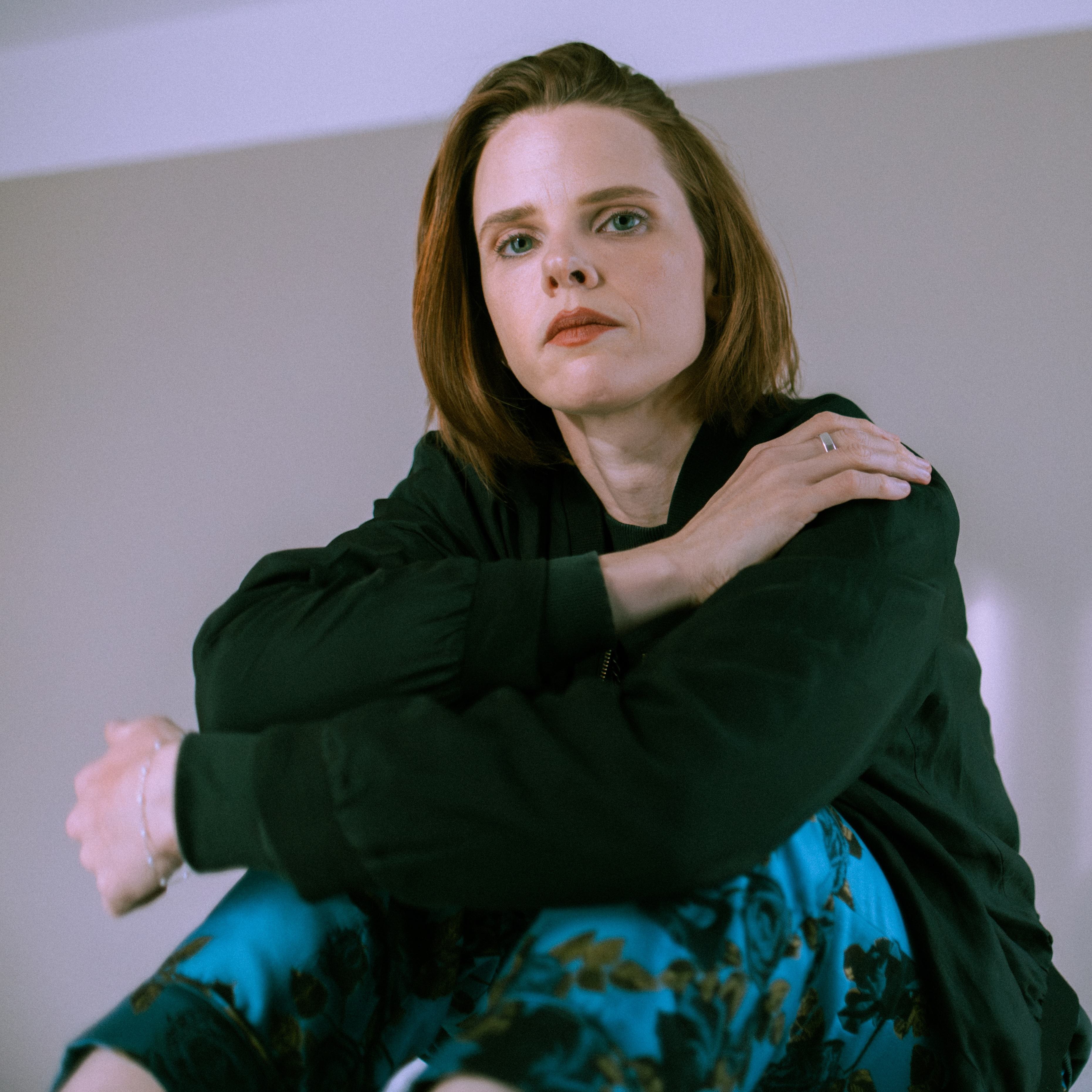
There’s no disagreeing when, like An Overview on Phenomenal Nature, so much of My Light, My Destroyer’s power lies in suggestion and colouring between the lines, not just lyrically but in Jenkins’ prolific use of ambient sounds and field recordings to elevate her storytelling. With An Overview…’s glistening speak-sing voyage “Hard Drive” having cemented its place as one of the finest songs of the decade so far, Jenkins has doubled down on her use of spoken word to illuminate the winding corridors of her experiences. “Attente Téléphonique” aside, which was recorded in the kitchen of her brother’s partner’s parents' apartment in Paris using a frying pan splatter screen in place of a microphone shield, the spoken passages on My Light, My Destroyer mostly offer snatches of the real world – from what sounds like a supermarket to the home she shares with her family on the Upper West Side, where she grew up.
Grabbing her purse, she pulls out a pair of white binaural Sennheiser headphones that are her near-constant companion, allowing her to capture sounds and snatches of conversation wherever she goes. “I’m always checking in with my intentions,” she says, addressing the ethical elephant in the room. “Like, I’m never trying to catch someone in a compromising position, but I am trying to capture people as themselves, as candidly as possible, and most of the time I’ll tell them if I’m recording.”
When it comes to recording her family at home, Jenkins admits that she’ll sometimes “stretch the rules a little bit” and gather voice memos without them knowing, to listen back through later on the subway or in quiet moments alone. Now in her early 40s, Jenkins has come to treasure those semi-stolen moments of unfiltered family time. Listening back on her dad retelling one of his well-trodden stories or an evening of stargazing with her mother can take on a greater significance than the conversations had in the moment. “It’s pumped with nostalgia,” she says. But, more than that, it’s a way for Jenkins to, again, take on a new perspective. “We all can sort of regress when we’re around family, and I think that recording them helps me to switch into being a curious observer,” she says. “Especially whenever I find myself slipping into mind states that are maybe not my best self, mind states that are full of hindrances; if I can catch myself and switch into that curious observer role, it’s a very helpful state to be in.”
As stargazing destinations go, you wouldn’t automatically think of NYC and its square miles of light pollution as an ideal spot, but that’s part of what Jenkins found so charming about her mother’s gentle lecture. Though she ended up titling the song after the red giant Betelgeuse, she almost took that part of the song out completely as she felt the name of the star “stuck out in a funny way.” Instead, digging into that first instinct, she realised that, often, something that sticks out can actually end up being the thing that makes a song. “I realised that the reason I wanted to take it out was because I don’t care about that star,” she says. “So then I asked myself, why don’t I care about it? You know, it’s part of the constellation Orion and at some point it will become a supernova, so I started to learn more about it.”
Jenkins compares learning about the night sky to learning the tarot deck, picking out one card at a time and really focusing on it, “looking for it in my surroundings and building an intimate relationship with it,” as a way to internalise and “store it in mind, body and spirit.” But unlike the tarot, which has a finite number of cards (78, to be exact), it would take dozen lifetimes to know even just a fraction of our universe. Jenkins has her work cut out for her, but nights spent crawling through the NASA-funded OpenSpace platform and at the Hayden Planetarium just off Central Park have her “absolutely obsessed.” A friend has even let her “fly” the planetarium at the Lower East Side Girls Club a few times. “I’m afraid that this is only the beginning,” she jokes. “Gideon says he read somewhere that a total solar eclipse will turn scientists into poets and poets into scientists, and I think that’s what’s going on here. Suddenly, for the first time in my life, I’m becoming obsessed with this vast world of astrophysics that’s been available to my whole life and just being a total fan girl of the people who spend their lives in this way.”

Towards the end of Howl’s Moving Castle, before the dramatic reveal of Howl and the shooting star/fire demon Calcifer’s fateful bargain, there’s a scene where Howl takes the heroine Sophie through the ever-changing door of the castle to visit the hometown she’d left after being cursed by the Witch of the Waste – only the hat shop where she’d once lived and worked has become a beautiful flower shop, and it’s all hers. It’s a small but loving detail in Miyazaki’s film (and, truthfully, explained much more clearly in Diana Wynne Jones’ original story), and a setting in which Jenkins’ “Delphinium Blue” could conceivably take place.
In the song, Jenkins recounts the menial tasks that filled her days of working in a flower shop in Manhattan between tours, attracted to the routine and regularity it offered, and the freedom to jokingly indulge an image of herself as a Daria-like figure of the flower shop world: “a depressed poet with a capital P, trying to find joy in doing very repetitive things.” She laughs. “Of course, that was not really much of a stretch, but I think there’s something quite satisfying and healing about making fun of yourself. Jokes about depression are usually the ones that make me laugh the hardest.”
Aside from her boss Max and a couple of co-workers, Jenkins never shared that she was a musician. She recalls one weekend where she accidentally left her notebook of lyrics behind and prayed that no one had read it. “I looked at myself as if I was a monk, with this almost Sisyphean task of trying to keep the place looking presentable,” she says. “I like being able to shed myself and not cling too closely to any particular identity. I think it’s important to not identify as just one thing, especially when you're going through change.”
Looking back now, Jenkins sees her years at the flower shop – which she started after a failed audition to join the Dirty Projectors touring band and only left after being offered the Purple Mountains gig – as something she really needed at that time of her life. Slowly but surely, through being in the same place and doing the same thing over and over, she says she found the clarity and self-awareness she’d been seeking, and that’s reflected in the lyrics of “Delphinium Blue.” “It’s a pretty subtle song on the surface,” she adds. “But at the end there’s a sort of recognition of a transformation that has occurred, and one that’s not necessarily uplifting. I really believe that transformation and clarity are often extremely painful. To be able to see something in the harsh light of day and move into the next phase of your life, you first have to really look at it and face it head on.”
Almost inconceivably, “Delphinium Blue” almost didn’t make the record, coming in as a late addition to the docket after Jenkins finally landed, after years of trying, on a version she felt really clicked. She describes the song as “like a little crustacean looking for a shell, trying different ones that didn’t really fit,” until one afternoon in Brooklyn with her friend Isaac Eiger (ex-Strange Ranger, now recording as Threshold) where everything fell into place. Taking it to My Light, My Destroyer producer Andrew Lappin, Jenkins pleaded for the song to be find its way into the project. “I could tell he didn’t really want to add to the loose ends we still needed to tie up, but he listened to it and liked it, so we formulated a plan for how to bring it into the world of this record. To me, it’s a record full of outliers anyway, so, in a weird way, to have another in the mix just felt like it actually rounded things out.”
It's no secret that florists love delphiniums, as one of the few naturally blue flowers occurring in nature, but no one loves blue more than a poet. As personal as Jenkins’ song is, it’s also a tribute of sorts to one of her favourite books: Maggie Nelson’s prose collection Bluets, which meditates on heartbreak, grief, and other sadnesses in devastatingly powerful fashion. Like Jenkins sweeping the floor, washing the windows, and counting the cash in her shop, Nelson describes distracting herself from her crushing depression by collecting blue objects and images – a way to make her life “feel ‘in progress’ rather than a sleeve of ash falling off a lit cigarette.” “I’ve become a servant to sadness,” she writes, and it’s this line that Jenkins echoes in “Delphinium Blue” (“I sweep the floors but I'm talking to you / I see your eyes in the delphinium too / I've become a servant to their blue”), giving herself over to her obsession and sadness.
“It’s about abandoning yourself to the feeling that you’re in,” she says. “I really wanted to reference and be in dialogue with Maggie’s work, but also kind of respond to it by saying that not only am I in service to others, making bouquets and selling stems, but also to this idea of being a servant to blue as a representation of sadness. Of course, when I wrote it, someone was like, ‘Oh, a missed opportunity to call it ‘Delphinium Blues,’ and I was like, absolutely not.”

When Jenkins and I get together again six months later, she’s in Amsterdam, I’m in Sweden and the world is one step closer to what feels like a death spiral with the re-election of convicted felon and career criminal Donald Trump. Jenkins was on a plane across the Atlantic on election night, and she’s spent the past two days trying not to let the devastation overshadow her responsibilities on tour. “Trump’s existence is vile to me, and against everything I stand for,” she says. “But the fact that so many people follow him is, I think, more terrifying than he is. It just feels like all the work that we’ve done to feel safer in the world is being taken away.”
Her despair isn’t helped by the fact that, on the first night in Amsterdam, the band’s van was robbed, leaving them scrambling to find new equipment for the show the next day. “Everyone’s so resilient and we’ll recover, but it also feels like a real violation,” she says, gazing out of the window. “It’s hard on the nervous system, needing to operate all the time with this hyper vigilance. It’s not good for my cortisol levels, which are already taxed as a woman.” She pauses and looks back into the camera. “I’m so sorry, I feel like I’m just complaining today.”
We’ve already established that there’s no silver lining to tragedy, but the one thing that Jenkins is holding on to in these times is that people will always need music. NPR recently featured “Hard Drive” on their election day “anti-anxiety playlist,” and Jenkins says she’s touched that people still reach out to her to say that they find comfort in the song, which she wrote in the middle of Trump’s first stint at the White House. “It’s not outwardly political but it does acknowledge that we live in a difficult world with difficult political realities, and I think it recognises that art is political even if you don’t want it to be,” she muses. “I think that’s something unique about that song, and, truthfully, something I didn’t think very much about at the time because I didn’t think anyone was going to hear it.”
Coming from a background steeped more in the jazz tradition than in pop, Jenkins enjoys the freedom that spoken word offers in terms of being able to change the lyrics from night to night on tour as a way of acknowledging the time and the state of the world that has passed since she wrote it. The idea of a song existing in one single, rigid form for eternity is anathema to her, as demonstrated by the companion releases to An Overview on Phenomenal Nature that shared first takes and remakings of the songs. With My Light, My Destroyer, she’s less willing to open that box. “I could release a whole lot of material because I had to shed so many layers of skin in order to create the thing that I made, but I made that version for a reason,” she says. “Part of the reason I did that with the previous album is that it was made so quickly and sent out into the world so quickly, whereas My Light, My Destroyer was way more considered and crafted and I really did release the thing that I wanted to release.”
Instead, what she’s doing is bringing new and unique elements to each live show, digging into the sonic palette of the album and weaving them in and out of the songs differently in the live setting. At the end of making an album, there’s often a whole pile of discarded sounds that were created along the way, and Jenkins sees the value in using those to bring her songs into the live world in ways that will likely never exist on record. “I think a lot of artists sometimes forget about this other library of sounds,” she says. “For me, it’s been really fun to use them to paint different strokes with the same palette using Ableton Live, and to give people an experience – and myself an experience – that only happens in the live setting.”
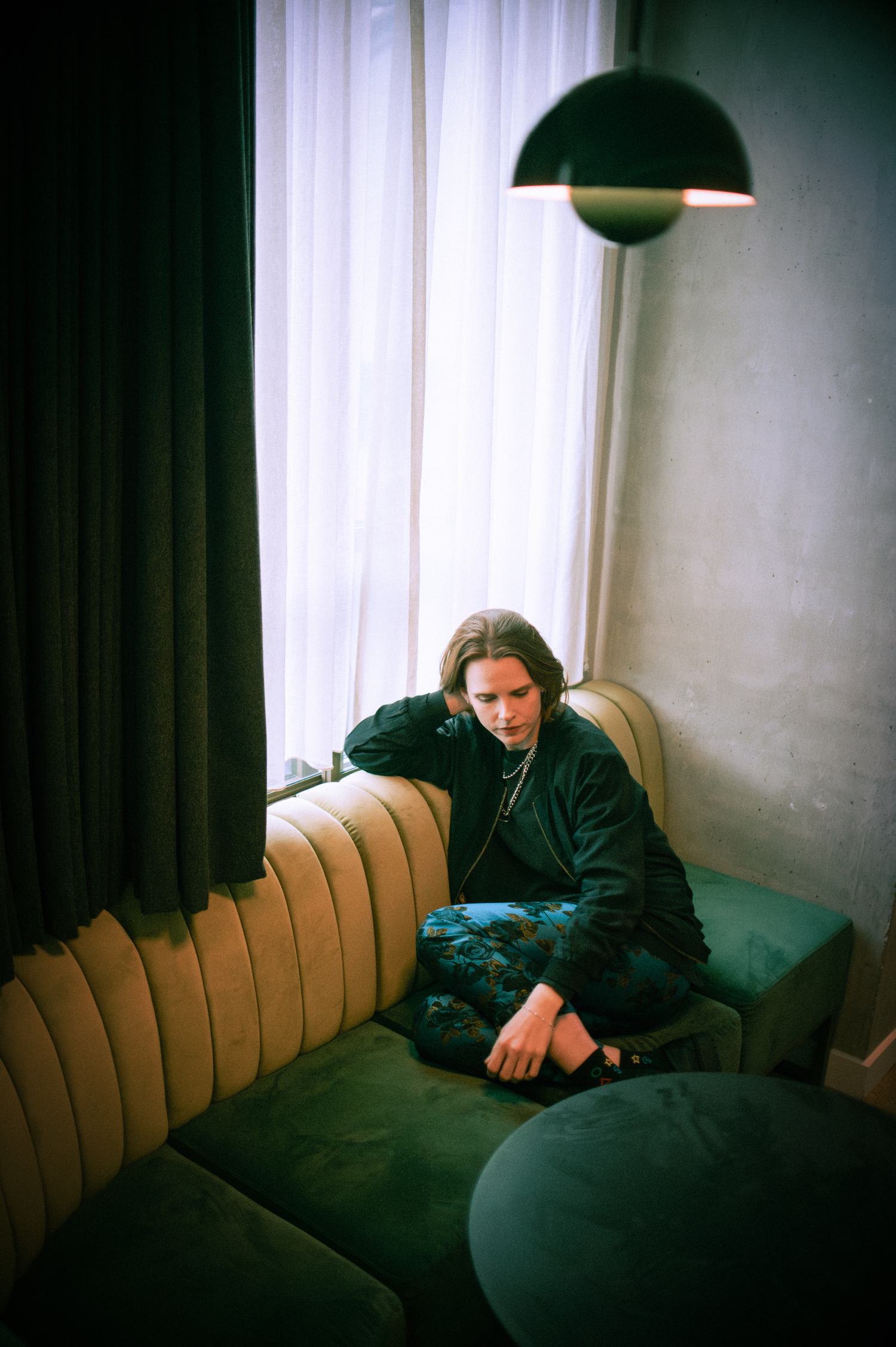
The week before flying out to Europe, Jenkins and some friends took over the Music Hall of Williamsburg in Brooklyn for a Halloween show that doubled as a fundraiser for the Palestinian women-led liberation movement Healing Our Homeland. Wanting to steer clear of the gore aspect of Halloween (“It just felt really off to me at this point,” she says, referring to the daily social media torrent of inhumane horrors from Gaza), she turned the show into a ‘Pets for Palestine’ event, with makeup artists on hand to paint on noses whiskers and selling sequinned cat ears as merch.
“A few days after I met you in London, I went home and filmed the music video for “Petco” and realised in the process just how much expression that song holds for me, and I think I’ve really leaned into it since then,” she says. It was a no-brainer, then, that her costume for the show would be a Petco manager (UK readers, think Pets at Home, only less green). “I built a whole character for myself,” she says, laughing. “She’s 17. She loves vampire novels. She’s a reptile person. She has, like, two iguanas, and a tarantula of course. Maybe she’s breeding snakes at home too, you know? I just love being in the world of that song. All my performative instincts come out, unapologetically, and they feel really okay in that space.”
Besides raising money for a good cause, for Jenkins the real triumph of the show was the incredible feeling of realising a dream of a song and what it means to her “to the point of being in a room with 500 people dressed up as cats.” “When I have an idea, I like to take it as far as I can,” she says, recalling how, growing up with her siblings, they’d all play dress up, form bands and invent new characters for themselves. “This show was the most ‘me’ thing I think I’ve ever done.”
In another passage of his memoir, Lee de Forest wrote of the “long, long calm” in which the wreckage of our youthful hopes finally disappears, leaving us wondering why we ever dreamed of sailing in them in the first place (what can I say, the man loved a nautical metaphor), and, at this point in her career, it feels like Jenkins could in some way relate. Having spent the best part of a decade writing songs of groundlessness and transience, My Light, My Destroyer feels like a wresting back control of the rudder.
“It’s taken me a lifetime to figure out how to do music in a way that is sustainable,” she says, grateful for the people she’s gathered on the way. In an industry that feels increasingly stacked against its own artists, Jenkins is proof that it’s the showing up that counts, the getting out of your own way. The not fearing transformation, however painful it might be, however slow and overdue. It's the finding your people, making your own blanket, and gazing into the blue.
My Light, My Destroyer is out now via Dead Oceans. Cassandra Jenkins returns to the UK in June. Tickets available here.
Get the Best Fit take on the week in music direct to your inbox every Friday

Cameron Winter
Heavy Metal
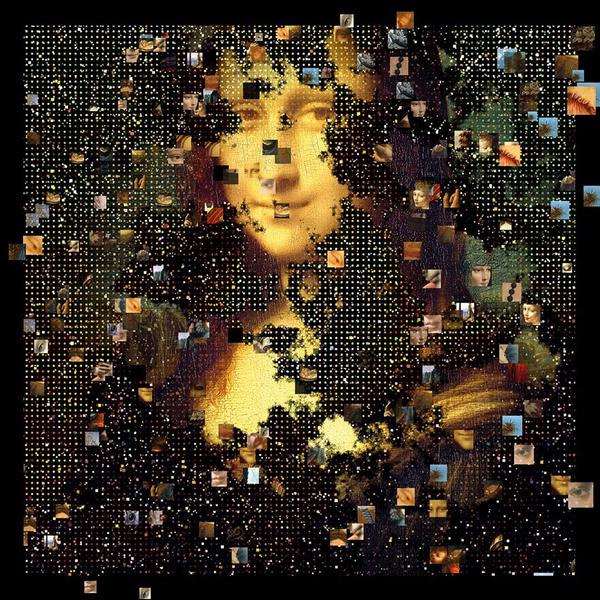
Sasha
Da Vinci Genius
